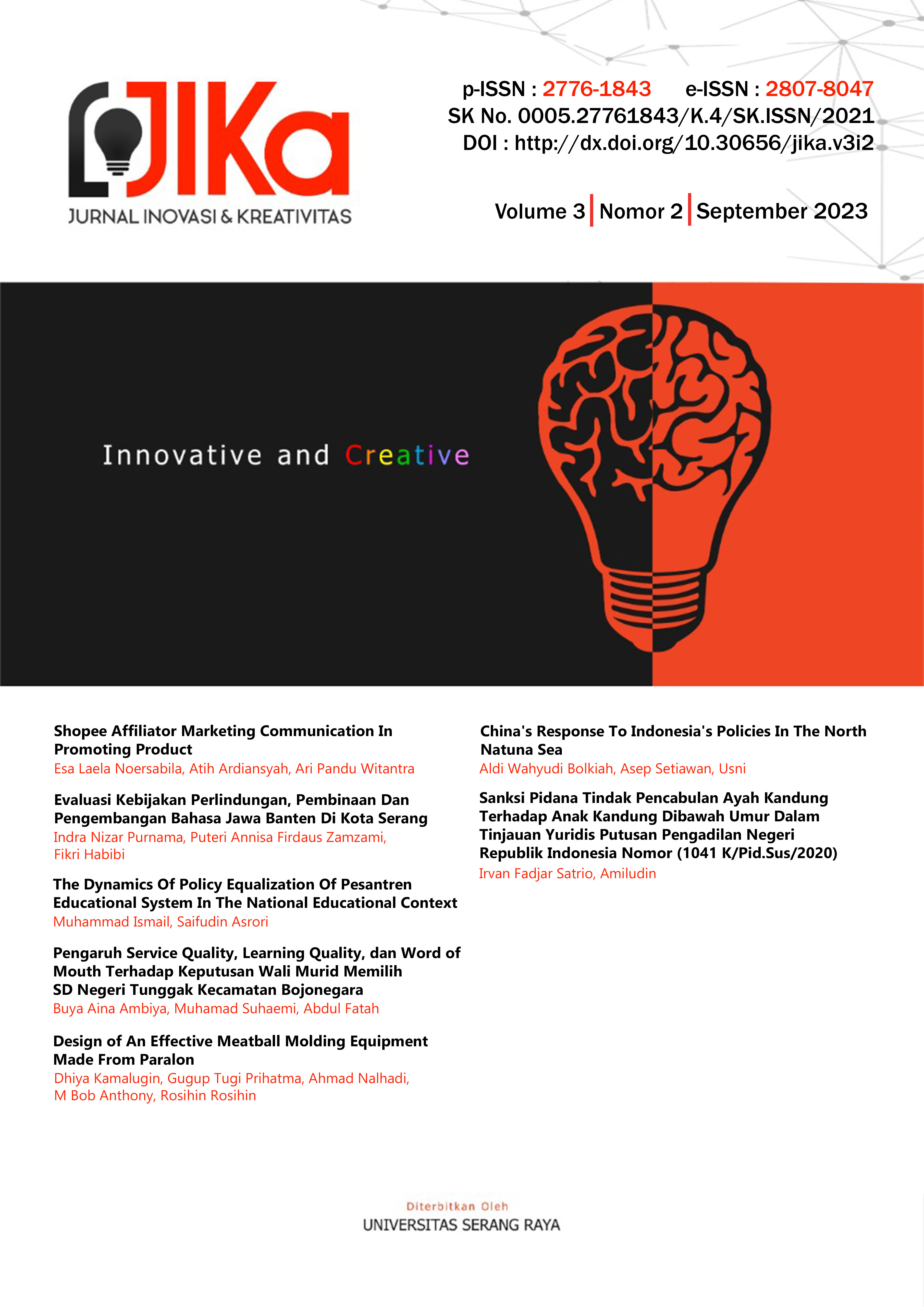The Dynamics Of Policy Equalization Of Pesantren Educational System In The National Educational Context
DOI:
https://doi.org/10.30656/jika.v3i2.8116Keywords:
Kebijakan Pemerintah, Pesantren Mu'adalah, Mekanisme Penyesuaian, Kulliyatul Muallimin al-Islamiyah, Pondok Gontor, IndonesiaAbstract
Problems: Government policy on equalizing the Islamic boarding school education system with equivalent educational entities or muaddalah raises concerns among the pesantren community that the essence and distinctive nature of religious education, which has been the identity of pesantren for years, may undergo changes.
Purpose: The purpose of this article is to depict the ability of the Islamic boarding school education system to adapt to the evolution of government policies, transitioning from marginalization and discrimination against pesantren to recognition as religious educational institutions. This transformation ultimately leads to achieving the level of equality (muaddalah) as formal educational entities in Indonesia
Methodology: The research is conducted using a quantitative approach with a case study design on the adaptation mechanisms of the education system at Pondok Gontor, East Java, towards muaddalah policies.
Results/Findings: The results of this research indicate that the institutional approach illustrates that educational institutions are entities with formal and rational management structures but have loose connections in educational activities. Policy alignment is carried out innovatively and dynamically, where the education system of Kulliyatul Muallimin al-Islamiyah (KMI) officially adopts accreditation mechanisms, management evaluation, teacher qualifications, curriculum standards, and educational infrastructure in accordance with government policies. Nevertheless, the commitment as an educational institution, a place where students study religious knowledge (tafaqquh fi ad-din), shape the character of students, and enhance skills to contribute to societal progress, remains steadfast and unchanged.
Paper Type: Implementation policy research
Downloads
References
Abdullah, T. (1994). History, Political Images and Cultural Encounter: The Dutch in the Indonesia Archipelago. Studia Islamika, 3(1).
Aimah, S. (2020). PMA Muadalah sebagai Tantangan dan Peluang Meningkatkan Standar Pendidikan Pesantren. Jurnal Darussalam: Jurnal Pendidikan, Komunikasi Dan Pemikiran Hukum Islam, 12(1), 58–71.
Asrori, S. (2017a). Negosiasi Ruang Publik: Modernisasi Dan Penguatan Civil Society Model Pesantren. Kordinat: Jurnal Komuniskasi Antar Perguruan Tinggi Agama Islam, 16(1).
Asrori, S. (2017b). Politik Kerukunan di Indonesia; Model Dialog Kelembagaan Antar Umat Beragama. Ciputat: YPM.
Asrori, S., & Syauqi, A. (2020). Kontribusi Pendidikan Islam dalam Reproduksi Identitas Sosial Muslim Indonesia. Mimbar Agama Budaya, 13–22.
Atabik, A., & Muhdlor, A. Z. (1999). Kamus Kontemporer Arab Indonesia “Al- Ashry.†Krapyak: Multi Karya Grafika,.
Badrudin, Yedi Purwanto Siregar, C. N. (2017). Pesantren dalam Kebijakan Pendidikan Indonesia. Jurnal Lektur Keagamaan, 15(1), 233–272.
Benda, H. J. (1958). Christiaan Snouck Hurgronje and the Foundations of Dutch Islamic Policy in Indonesia. The Journal of Modern History, 30(4), 338–347.
Burhanudin, J. (1997). Islamic Knowledge, Authority and Political Power: The Ulama in Colonial Indonesia. Universiteit Leiden.
Fahmy, H. (2015). Modern Pondok Pesantren: Maintaining Tradition in Modern System. Tsaqafah, 11(2), 223–248.
Flyvbjerg, B. (n.d.). Five Misunderstandings About Case-Study Research. Qualitative Inquiry, 12(2), 219–245.
Franklin, N. J. (2020). Islam and the Dutch in the East Indies: Oppression or Opportunity? The European Legacy. https://doi.org/DOI: 10.1080/10848770.2020.1760467
Ghofarrozin, A., & Janah, T. N. (2021). Menakar Keberpihakan Negara terhadap Pesantren melalui Pengesahan UU Nomor 18/2019 tentang Pesantren. Islamic Review: Jurnal Riset Dan Kajian Keislaman, 10(1), 1–18.
Hamzah, M. (2019). Transformasi Pondok Pesantren Muadalah: Antara Fakta Historis Dan Tantangan Masa Depan. Reflektika, 13(1), 23–48.
Hefner, R. W. (2018). Which Islam? Whose Shariah? Islamisation and citizen recognition in contemporary Indonesia. Journal of Religious and Political Practice, 4(3).
Jackson, E., & Parker, L. (2008). Enriched with Knowledge’: Modernisation, Islamisation and the Future of Islamic Education in Indonesia. RIMA: Review of Indonesian and Malaysian Affairs, 42(1), 21–53.
Jahroni, J. (2006). Merumuskan Modernitas: Kecenderungan dan Perkembangan Pesantren di Jawa Tengah. In J. Burhanuddin & D. Afrianti (Eds.), Mencetak Muslim Modern, Peta Pendidikan Islam. Jakarta: PT Raja Grafindo Persada.
King, G., & Keohane, Robert O. Verba, S. (1994). Designing Social Inquiry: Scientific inference in Qualitative Research. Princeton University Press.
Makruf, J. (2009). New trend of Islamic Education in Indonesia. Studia Islamika, 16(2), 243–290.
Noer, D. (1980). Gerakan Moderen Islam di Indonesia 1900-1942. Jakarta: LP3ES.
Rachman, H. A. (1997). The pesantren architects and their socioreligious teachings (1850-1950). University of California, Los Angeles.
Ridwan, A. (2020). The dynamics of pesantren leadership from the dutch ethical policy to the reformation periods. Epistemé: Jurnal Pengembangan Ilmu Keislaman, 15(02), 365–400.
Tan, C. (2012). Islamic Education and Indoctrination: The Case in Indonesia. Routledge.
Tan, C. (2014). Reforms in Islamic education: international perspectives (C. Tan, Ed.). A&C Black.
Tayeb, A. (2018). Islamic Education in Indonesia and Malaysia: Shaping Minds, Saving Souls. New York: Routledge.
Wahid, D. (2006). Pendidikan Islam di Jawa Timur; Kecenderungan dan Variasi. In J. Burhanudin & D. Afianty (Eds.), Mencetak Muslim Modern, Peta Pendidikan Islam. Jakarta: PT. Raja Grafindo.
Yin, R. K. (2011). Applications of case study research. Sage.
Yusuf, M. A., & Taufiq, A. (2020). The dynamic views of Kiais in response to the government regulations for the development of Pesantren. Qudus International Journal of Islamic Studies (QIJIS), 8(1), 1–32.
Ziemek, M. (n.d.). Pesantren dan Perubahan Sosial. Jakarta: P3M.

.png)


.png)


.png)

.png)

